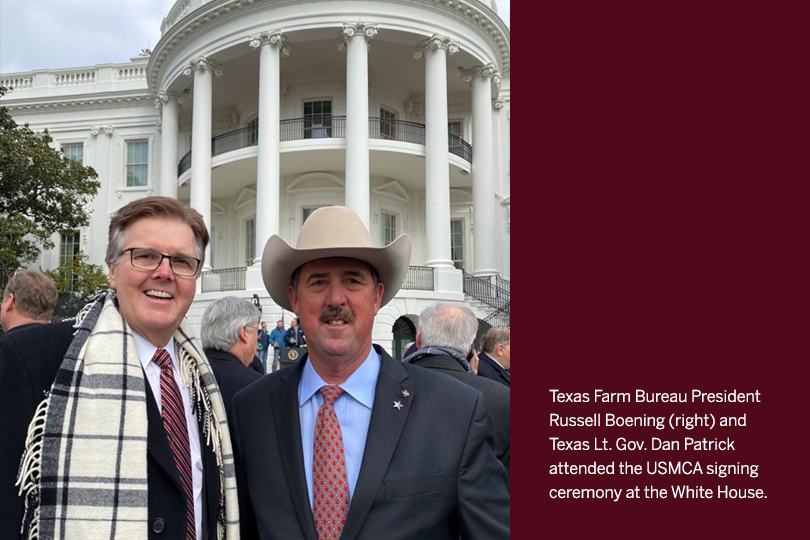By Jessica Domel
Multimedia Reporter
Calling it a colossal victory for U.S. farmers, President Donald Trump signed the implementation bill associated with the U.S.-Mexico-Canada Agreement (USMCA) on Wednesday, Jan. 29.
“This agreement is a tremendous breakthrough for American agriculture,” Trump said.
Texas Farm Bureau (TFB) President Russell Boening and a number of Texas lawmakers attended the signing in Washington, D.C.
“USMCA represents a tremendous opportunity for Texas farmers and ranchers to increase sales to customers in two very important foreign markets and to take another important step toward the economic recovery of Texas agriculture,” Boening said.
The signing comes more than 20 months after the U.S., Mexico and Canada officially began negotiations for the updated trade pact.
The U.S. House of Representatives ratified the deal in mid-December. The U.S. Senate followed Jan. 16 in an 89-10 vote.
All U.S. Senators and representatives from Texas voted in favor of the trade pact, which is designed to replace the decades-old North American Free Trade Agreement (NAFTA).
The Mexican legislature has already passed USMCA.
Lawmakers in Canada are considering the trade pact.
“We look forward to the Canadian Parliament’s approval of the agreement so that it can go into full effect. USMCA is a strong, modern agreement that provides a framework for other agricultural trade deals,” Boening said.
Boening noted NAFTA, which USMCA will replace, was beneficial to Texas farmers, ranchers and the overall economy, but USMCA is expected to do more.
“USMCA provides new market access for American dairy and poultry products while preserving the zero-tariff platform on all other ag products,” Boening said. “Additional provisions enhance science-based trading standards among the three nations as the basis for sanitary and phytosanitary measures for agricultural products, as well as progress in the area of geographic indications.”
If Canadian officials ratify USMCA, agricultural exports to Mexico and Canada from the U.S. are expected to substantially increase.
“These increased sales come at a critical time as Texas farmers and ranchers try to recover from several years of lower net farm income and difficult market conditions,” Boening said. “This trade agreement opens more doors and builds on the success of the North American Free Trade Agreement.”
Before the Senate vote, Sen. John Cornyn of Texas told the Senate Finance Committee that as a Texan, he’s long understood and appreciated the close economic relationship with Canada and Mexico.
“In 2018, Texas exported more than $137 billion in goods and services to Canada and Mexico. This trade supports an estimated 950,000 jobs in Texas and has helped make our state’s economy the 10th largest in the world–not just in the country–but in the world,” Cornyn said. “Much of this was made possible because of NAFTA, which as we know took effect a quarter of a century ago, and a lot has happened since that time.”
Cornyn said as beneficial as NAFTA has been, it’s time for an update.
“That’s precisely what the USMCA will do. It brings NAFTA into the 21st Century,” Cornyn said. “It will provide economic certainty, reduce tariffs and greater opportunity for all sectors including our farmers, ranchers and producers, manufacturers and goods and services. It will provide needed infrastructure along the border, as well.”
U.S. Sen. Ted Cruz of Texas called USMCA a win for Texas farmers, ranchers, businesses and manufacturers.
Under USMCA, all food and agricultural products that were sold tariff-free will remain tariff-free.
According to the U.S. Trade Representative’s Office (USTR), USMCA will create new market opportunities for U.S. dairy, poultry and egg exports to Canada and will provide new access for U.S. peanuts, processed peanut products and a limited amount of sugar and sugar containing products.
“The USMCA, as we call it, will massively boost exports for farmers, ranchers, growers and agricultural producers from North to South, and from sea to shining sea. It also has tremendous impacts on manufacturers and all of the other things — good for everybody,” Trump said at the American Farm Bureau Federation Annual Convention in Austin earlier this month.
Canada will provide new tariff rate quotas for dairy for the U.S.
“Canada will finally provide greater access for American dairy,” Trump said. “It will grow annual exports to our neighbors by an estimated $315 million.”
Six months after USMCA goes into effect, Canada will drop its class six and seven dairy pricing systems that have hurt U.S. dairy sales globally.
The U.S. will provide reciprocal access on a ton-for-ton basis for imports of Canadian dairy products on a first come, first-served TRQ basis.
Under the deal, Canada will grade imports of U.S. wheat no less favorably than Canadian-grown wheat.
Both Canada and the U.S. have agreed to discuss issues related to seed regulatory systems.
The trade pact addresses unfair, market distorting subsidies and currency manipulation among other issues.
“It is the first trade agreement that contains a ‘sunset’ provision that will give future administrations leverage to ensure that, unlike the disaster that was NAFTA, USMCA will never become outdated and out of balance,” USTR Robert Lighthizer said. “USMCA is now the new gold standard against which all future trade agreements will be judged.”


Love it, Finally a President that is a true business man and loves the USA. I only hope he can keep up the good work for a long time.
Thank you President Trump for working so hard this important trade agreement. Thank you for building this country up while a handful there in Washington are trying to tear you and this nation down.